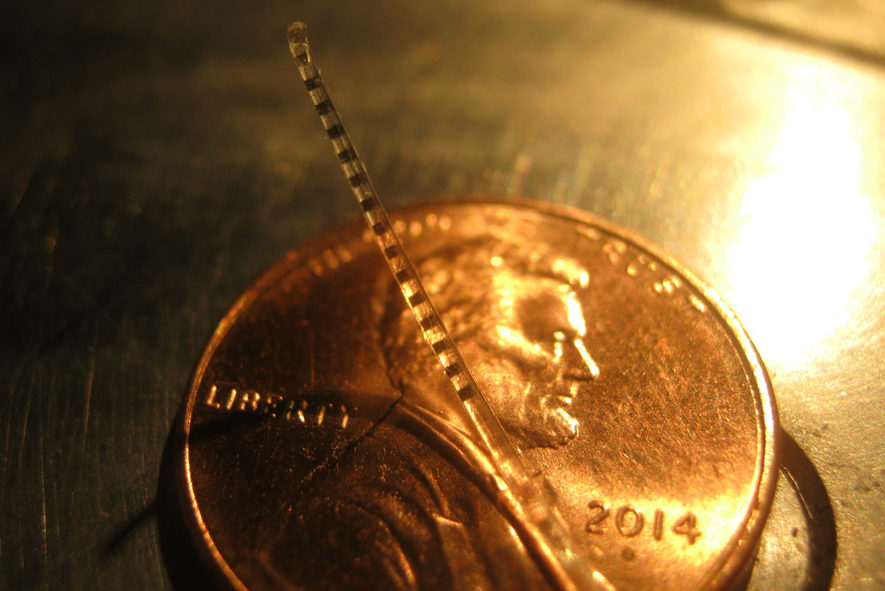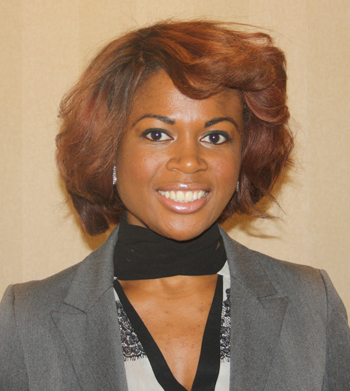Cutting the cost of hearing
MEMStim’s technology is already two phases into pre-clinical testing in preparation for FDA examination. Very few MEMS devices have made it this far.
Dr. Angelique Johnson, founder of the startup company, MEMStim, aims to drastically reduce the cost of cochlear implants
Dr. Angelique Johnson (MSE PhD EE ’07 ‘11) isn’t interested in making small changes. As the founder and CEO of MEMStim and longtime researcher of implantable neural devices, she’s committed to making radical improvements to new medical technologies.
MEMStim has fully automated the manufacturing process of next-generation neural devices. With the power of microfabrication, she aims to provide cochlear implants at a fraction of the cost of current manufactured alternatives.
A Perfect Match
Dr. Johnson took to her field from a very young age – in fact, she was immersed in it since birth. Homeschooled alongside 10 siblings by her chemical engineer father and mathematician mother, she had no trouble diving into a technical field when it came time to choose her course. Incidentally, the same was true of her siblings; all but one are in the tech and science fields and include 5 PhD or MD degrees, and the other has a degree in classical piano performance.
“My mother was very good at making math fun for us,” Dr. Johnson says. “She taught us through brain teasers and put us in a lot of summer programs for robotics and engineering.”
She stuck with this experience as an undergraduate at the University of Maryland, Baltimore County, where she studied computer engineering and math. Going on to pursue a higher degree wasn’t a question at that point – Dr. Johnson just needed to know where. Intent on finding a way to mesh her study of computers with the world of medical technology, she began her search.
“I wanted to impact people on a personal level,” she said.
She eventually came across the work of Kensall Wise, William Gould Dow Distinguished University Professor Emeritus. At the time, Prof. Wise was director of the NSF Center for Wireless Integrated MicroSystems (WIMS), now the Center for Wireless Integrated MicroSensing and Systems (WIMS2), and a leader in MEMS (micro-electro-mechanical systems) and microsystems, specifically in the area of neural probes and cochlear implants. She knew she had found the right place.
As a doctoral student, Dr. Johnson focused her efforts on a piece of tech called a microelectrode array. These devices hold multiple shanks or metal plates that can deliver neural signals, essentially serving to connect neurons with electronic circuitry. These are used in a number of medical devices that interface with the nervous system in some way, such as deep brain and spinal cord stimulators and cochlear implants.
Initially, Dr. Johnson focused her research on packing more features onto these devices. She added more electrodes that would allow for higher sound resolution; developed microfluidic channels which make surgical insertion safer and easier; and produced a mixed signal Application Specific Integrated Circuit (ASIC) that selects and activates electrodes across a high density array with just a few signal lines, allowing for superior sound performance with a greatly reduced footprint.
Innovative and Practical
Spurred on by discussions with WIMS Industrial partners, Dr. Johnson considered starting a company based on her research. To test the waters, she entered the Michigan Business Challenge, and came away with several awards, including the Pryor-Hale award for Best Business, and $27K to seed her company.
She also participated in the NSF Innovation Corps (I-Corps) program, which provided her project with funding and invaluable insight from industry. Through meetings with companies interested in her work, she found there was a high demand for the product she was offering – based purely on the process she used to make it.
What the companies saw was a technology that could dramatically reduce the cost of cochlear implants, making them affordable for a greatly expanded group of individuals.
The microelectrode arrays currently used in cochlear implants are manufactured partly by hand. This process leaves them prohibitively expensive for developing countries, with completed implants costing around $30,000. The microfabrication process Dr. Johnson uses, on the other hand, is completely automated. She can offer the same array at better than one tenth the cost. In combination with the effort of others to produce low cost implantable electronics, the micro fabricated arrays could lead to implants with a significantly reduced price point.

 Enlarge
Enlarge
The market for cochlear implants is already enormous – revenues exceed $1B, and are projected to grow by 20% each year. However, only about 1% of those who could benefit from the technology are able to afford the device. There is an ongoing initiative in many developing nations to offer this technology to its deaf citizens, but most can only afford a small quantity.
“We’re focusing on price right now because there is a huge humanitarian need for that price cut,” Dr. Johnson says. “Cochlear implant companies are aware of this, and are very eager to adopt new technology on price point alone.”
MEMStim’s technology is already two phases into pre-clinical testing in preparation for FDA examination. Very few MEMS devices have made it this far.
Once this technology is approved and in the market, Dr. Johnson plans to improve the functionality of the device by adding more electrodes, a system for drug delivery, and position sensors to visualize surgical insertions. She also hopes to expand into the world of neural stimulators
Advice for Students
As both an entrepreneur launching a company in a new field and an African American woman in an industry that has always been challenged by its lack of diversity, Dr. Johnson understands the importance of identifying mentors in a similar position.
“I had a broad range of diverse friends at Michigan. However, I was still the only African American female in my entire PhD program,” she says. “A lot of students may feel isolated in their environment. I encourage students not to undervalue the significance of peer and mentor support.”
For those who may be thinking of launching a startup company, she says, “Don’t love your science to death. Find out what your customers want. You may need to take a step or two back from what is possible until the market is ready, and until the infrastructure is in place.”
But most important for all students, and especially graduate students who are pushing into unfamiliar territory, is to remain confident in your own capabilities.
“It’s very important to be determined in what you’re doing. Not everyone will see the value in what you are doing, or see you as the person to bring about something great. The most important thing you can have is faith in your purpose and the determination to do the greatest work you can do.”
Dr. Angelique Johnson

 Enlarge
Enlarge
MSE PhD EE ’07 ’11, University of Michigan
Founder and CEO, MEMStim, LLC
MEMStim is based in Kentucky. Dr. Johnson leverages the expertise of a wide range of consultants, and is continuing to develop the technology in the cleanroom of the University of Louisville. She also mentors students and teaches courses at the business school at UofL.
STEM Outreach
Throughout both her education and professional career, Dr. Johnson has had a passion for outreach and mentoring for students, especially women and minorities in engineering.
As a Michigan student, she was involved in over a dozen outreach programs. These included coaching local robotics camps, involvement in the Grace Hopper Program, leading IBM camps, traveling to Abu Dahbi to encourage STEM education for Middle-Eastern and North African women, involvement in the Detroit Area Pre-College Engineering Program (DAPCEP), and membership in the National Society of Black Engineers (NSBE) and Women in Science and Engineering (WISE).
She was also helped establish the Nanotechnology and Integrated Microsystems Student Association (NIMSA), which is still active today.
Currently, she teaches entrepreneurship courses in the University of Louisville’s business school, and takes on informal mentoring of students interested in grad school, research, or entrepreneurship.
In the News
Science of Innovation: Micro-Fabrication for Cochlear Implants –NBC Learn
Kentucky SBIR/STTR Award Recipients – Kentucky Science and Engineering Foundation
Small technology making big difference at U of L – WDRB
Kentucky funds 9 high-tech startups – Louisville Business First
MEMStim takes first prize in the Michigan Business Challenge – EECS
 MENU
MENU 
